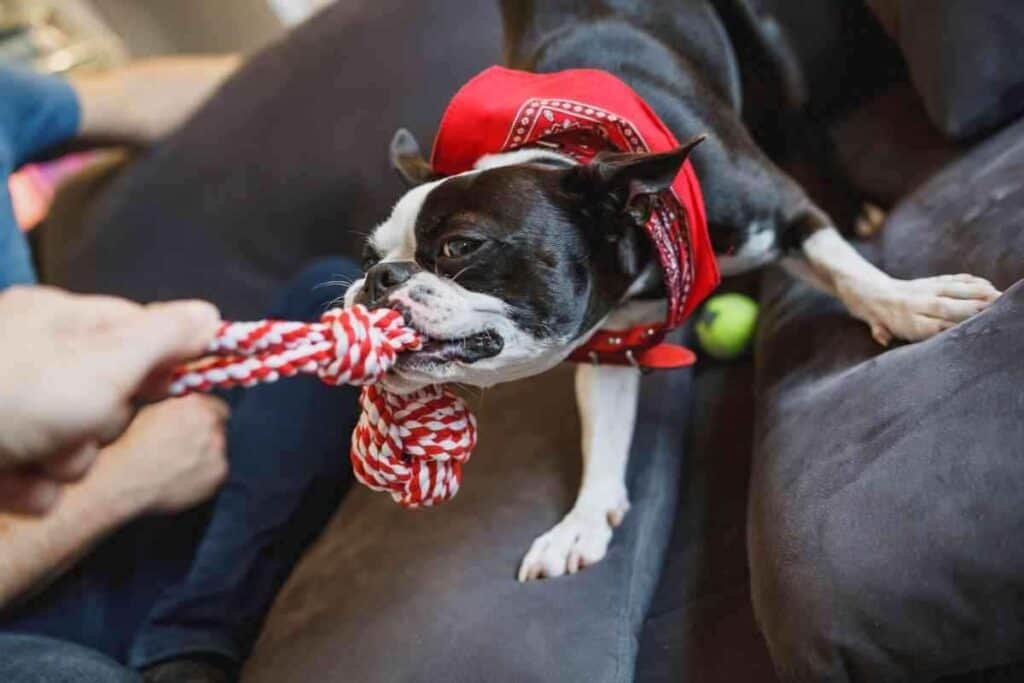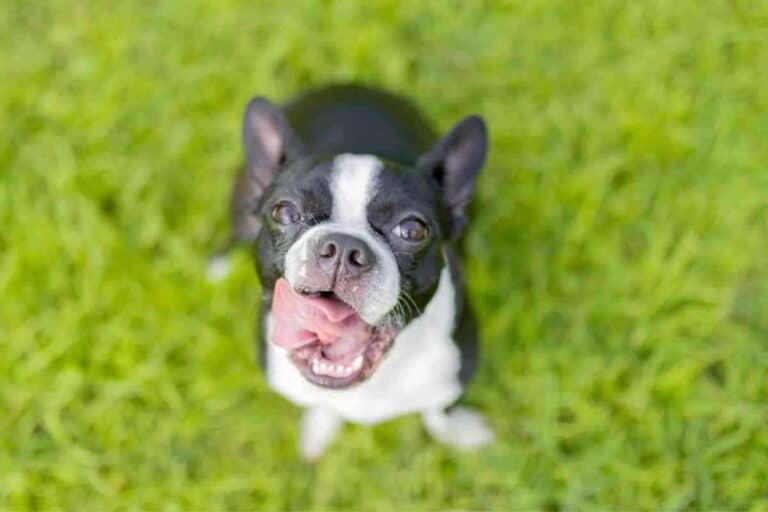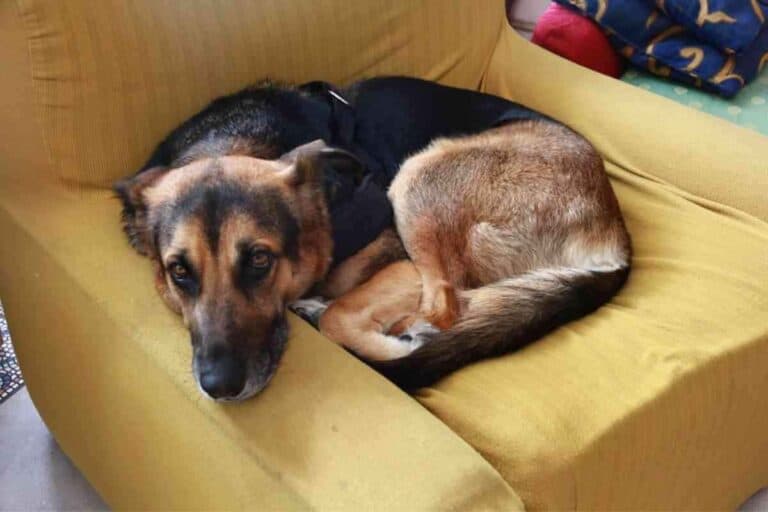When Do Boston Terrier Puppies Stop Biting?
You should expect some biting from your Boston Terrier puppy as they grow up. Biting is a natural instinct that your Boston will be compelled to do from a very young age.
Most Boston Terriers grow out of this behavior, but when?
When Do Boston Terrier Puppies Stop Biting?
Boston Terrier puppies will usually stop biting between six months and a year, but this depends on how the parents react to the biting, the puppies’ training, and how they respond to the training. Without intervention from the owners, your Boston may never stop biting on their own.
Each puppy is an individual, as are their family and the environment they live in. This environment and the family as a whole will help shape how fast a puppy learns certain things about life.
Regarding their temperament and personality, who the puppy is will also factor into how fast they stop biting?
Parents need to understand that their puppies biting and nipping is a normal part of their growth and development.
How the parent or family responds and what they do about it will impact the puppy and the outcome.
For instance, if a puppy bites a moms’ fingers during playtime and laughs and makes a funny comment about it but does nothing else, the puppy could mistake this for acceptable behavior.
They got a fun reaction and will try it again since it seemed fun and okay to do.
Training and even passive training in the early days can profoundly impact future obedience training and the puppy learning what is acceptable behavior and not.
During the early months, a puppy will be going through many changes, the first of which will be teething.
Teething can be an uncomfortable process that the puppy doesn’t completely understand.
They need to chew and may chew many things.
Due to the way they feel and what their body is going through physically, they may bite their parent or others and bite or chew unacceptable things.
While a parent should never punish or treat their puppy harshly for this or any other negative or bad behavior, they still should receive some training, even passively, at this point.
Along with direction, the Boston Terrier puppy should also be taught what they should be chewing and biting instead.
For instance, in the same scenario, the puppy and mom are playing, and the puppy bites the moms’ fingers.
Instead of mom laughing it off and doing nothing, she could offer a simple NO BITE in a matter a fact tone and then remove herself from the playtime for a while.
If possible, she could redirect the puppies biting to an acceptable object before she removes herself from playtime for a while.

This could be a teething toy or something else, as long as it is acceptable for the puppy to chew.
Some Boston Terrier puppies will continue to bite and nip longer than the one-year mark, and this is related to how their family or parent reacted and what they learned from the process.
That is why the reaction and training that comes after a moment where they bite is the most important.
A parent must understand that some puppies will naturally take longer to learn certain things.
They should be as patient as possible during this phase, so the learning process isn’t hindered.
It can be frustrating when a Boston Terrier puppy takes longer than another puppy to learn certain things like biting.
Every dog has their own brain, thoughts, feelings, and way they react to the world around them.
These are the things that shape their response and how easily they accept new training or learning that something which seems fun is not allowed.
Even for the best trained Boston Terrier puppy, there can still be days where they slip up and fall back on old habits.
This is the process of growth and development, and even we as humans can understand how easily this happens.
How can I stop my Boston Terrier puppy from biting?
The best way to stop your Boston Terrier puppy from biting is to redirect their behavior.
Redirecting is a positive way of training your Boston Terrier puppy what they can and should not do.
In this way, you as the parent are not saying NO, and you are saying NO to biting this but YES to biting that.
Channeling the puppy’s energy into biting something that is okay allows them to be who they are, a dog.
It also allows the puppy to positively fulfill a need or release their pent-up thoughts and emotions.
This promotes the puppy’s overall health without limiting their need to be a dog and vent what is inside them.
Dogs can’t communicate how frustrated or upset they are that they didn’t get more dog treats.
Instead, they will need an outlet to let go of that emotion to be happier on the inside.
If we were to try to prevent the puppy from biting or chewing when needed, it would be like asking them NOT to be a dog.
This can cause added turmoil and frustration, so it is far better for their health to find an outlet for them. This method is also beneficial for everyone in the family.
With time everyone can rest easy knowing that their personal belongings will not be harmed by chewing and biting.
With a puppy, redirecting also changes their thought process.
For instance, they were eyeing up that sock they wanted to rip apart because they were frustrated.
They get a hold of it, and mom redirects their attention to that favorite toy they haven’t seen in a while, and they HAVE to have it.
They toss the sock aside and move along to the toy, sock forgotten, frustration forgotten. The puppy is excited and happy about that toy they love.
Problem solved and with little to no frustration on everyone’s part.
Now, this may not always be the case.
Some Boston Terrier puppies may get a hold of something or someone and not want to move on to something else.
They are more headstrong than other puppies and have an independent mind that refuses to let go of what is happening.
In these situations, it may require that the parent needs to redirect differently.
For instance, the puppy is biting the moms’ hand during playtime, and she tries to get her fingers free without hurting the puppy, but he only bites harder.
The toy she waved around did nothing, and his tiny teeth were still embedded in her hand.
At this point, she could redirect the behavior by gently picking the puppy up and sitting down in a quiet spot together.
She might then provide soothing words and some quiet time and affection, which smoothly redirects the behavior, and eventually, the puppy is licking the fingers he was biting.
Each situation will be unique, and the tactics used and work may change from one day to the next, based on the situation.
As long as the parent is confident as the trainer and pack leader, everything else will eventually fall into place with time and persistence.
Final Thoughts
Biting can be a surprise when it comes from a new puppy.
Many parents struggle with accepting this normal behavior at this point in their puppy’s life.
Often parents will not know how to handle these situations, so they don’t end up dealing with biting for years to come.
The good news is that no matter what exact time it happens, all puppies will stop biting at some point when their parents have stopped reacting and taken control of the situation.






